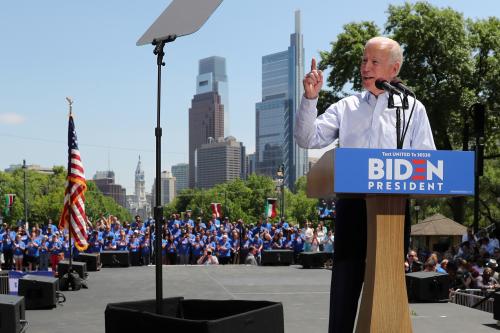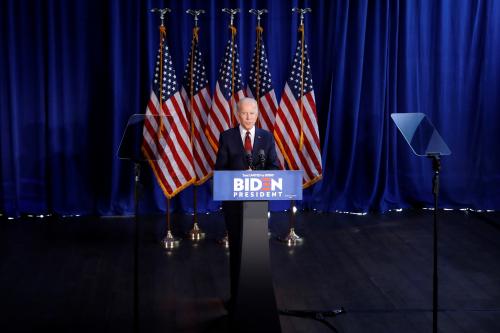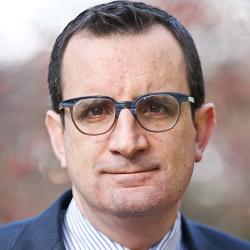It’s clear a President Joe Biden would pursue a very different foreign policy from Donald Trump. But would he seek to return to the approach of President Barack Obama or forge a new path? Thomas Wright analyzes the intra-Democratic debate on foreign affairs and America’s role in the world. This post originally appeared in the Internationale Politik Quarterly.
In many ways, Joe Biden is a known quantity when it comes to foreign policy. He believes in American leadership, the liberal international order, democracy, alliances, treaties, and climate change. He will seek to undo much of what President Donald Trump has wrought—he will quickly rejoin the Paris Agreement on Climate Change, he will try to revive the Iran nuclear deal, and he will work with other nations on combatting COVID-19.
But in other ways, Biden is a bit of an enigma. We know he will be different to Trump but will his presidency differ in significant ways from that of former President Barack Obama? Biden has called Saudi Arabia a “pariah state.” Does that portend a significant change in America’s posture in the Middle East? Will he buy into the concept of great power competition with China? Will he be more open to progressive reforms to the global economy? Will he continue Obama’s policy of pushing Europe to spend more on the military even as the pandemic exerts downward pressure on defense budgets?
It is difficult to answer these questions because to draw a contrast with Trump, Biden only needs to paint in broad brush strokes. He knows his connection to Barack Obama is an asset, and no political benefit exists in distancing himself from the former president. There may not be much to be learned from the exchanges on foreign policy between the candidates but there is a second parallel debate occurring in plain sight that is revealing. This is the intra-Democratic debate on foreign policy. Sometimes this is caricatured as a debate between progressives (aligned with Bernie Sanders and Elizabeth Warren) and centrists. That is a small part of it but even more significant is the debate within the centrist camp.
Distinguishing between centrists
Few outside of Washington have paid much attention to the debate among centrists. The progressive left tends to dismiss centrist thinking as unchanging from the Clinton or Obama administrations, but new strands of thought are evident in foreign policy journals, think tank reports, and the work of National Security Action, an umbrella organization established in 2017. Understanding this centrist debate sheds light on how a Biden administration might see the world.
It is useful to distinguish between two types of centrists. The first is the Obama baseline—the worldview articulated by the Obama administration in its final years. It involves a balanced approach to China and a determination not to have US foreign policy defined by geopolitical competition, combining a desire to avoid interventions in the Middle East with a determination to fulfill America’s traditional role in the region, support for globalization and integration, and a confidence that the long arc of history favors democracy if Americans can invest in their national power and strength, and a wariness of foreign policy activism without clear strategic objectives. One group of centrists continues to broadly hold this worldview, albeit with updates for the events of the past four years—for instance, they are more focused on Russian interference and human rights abuses inside China. I have been calling this group the restorationists.
The second group—whom I have called the 2021 Democrats—see Trump as an existential threat to American democracy and the international order. But they also believe that the world has changed in fundamental ways in the past eight years since President Xi Jinping came to power in China, Vladimir Putin returned as Russia’s president, and Obama was reelected. Nationalist populists have gained power in several countries leading to a weakening of democratic institutions and an existential crisis for centrists. Authoritarianism has used new technologies to modernize its tactics and tools of repression and control. Autocratic leaders have become more assertive and aggressive internationally as the domestic and international constraints fell away. Shared problems, such as climate change and pandemics, have worsened, but international cooperation has become harder to achieve and to explain to domestic audiences. The conviction that the world has fundamentally changed has led the 2021 Democrats to revisit the core tenets and assumptions of Democratic foreign policy in at least four areas: China, cooperation among democracies, foreign economic policy, and the Middle East.
The china challenge
No issue has been more controversial or widely discussed than how the United States should approach China. In 2018, Kurt Campbell, the assistant secretary of state for East Asian and Pacific affairs during the Obama administration, and Ely Ratner, Biden’s deputy national security adviser in Obama’s second term, published an influential article in Foreign Affairs arguing that some of the key assumptions underpinning China policy in successive administrations—for instance, that commercial engagement with China would lead to economic liberalization, and China would become a responsible stakeholder in the international order—were wrong. A year later Campbell coauthored another article in the same publication, this time with Jake Sullivan, who held several senior positions in the Obama administration, on how the United States could take a more competitive approach to China while avoiding confrontation.
Although there is a spectrum of opinion among the 2021 Democrats, some generalizations are possible. They generally believe that under Xi China has become more of a dictatorship than a merely autocratic system where power is shared or at least somewhat limited by a politburo. It is becoming more repressive, as demonstrated by the deployment of facial recognition technologies and social credit systems, the widespread use of concentration camps in Xinjiang, and the destruction of Hong Kong’s One Country Two Systems model. What they are unsure about is the degree to which this will transform China’s behavior internationally, which brings us to the second generalization.
They want the United States to adopt a more competitive strategy than the Obama administration but they are preoccupied with the question of how to blend competition and diplomacy so rivalry does not turn into confrontation and conflict and so some cooperation on shared interests remains possible. Both parts of this equation are important. They are more willing than the Trump administration to invest in diplomacy with China but they will not dial back competition in exchange for cooperation on shared problems, as the Obama administration was sometimes willing to do.
The 2021 Democrats worry the United States is falling behind technologically and economically and they believe major changes to US policy are required to get back into the lead. They want America’s alliances and partnerships, including across the Atlantic, to address the China challenge. They also believe that competing with China entails significant changes to domestic policy, including using industrial policy to develop the manufacturing base and modernizing the national infrastructure. They are open to the possibility of a limited decoupling between the United States and China, particularly on technology and supply chains for critical health supplies and other strategically important parts of the economy.
By contrast, the restorationists tend to be less willing to accept that Xi has transformed China into a different type of regime that is dictatorial, ideologically motivated, and determined to overturn key parts of the liberal international order. They stress the continuity of today’s China with the early and pre-Xi periods. They are less pessimistic about the changes in the distribution of power and whether the United States should use the China threat to mobilize the political system behind domestic changes. They are highly skeptical of any decoupling between the United States and China. Seen in retrospect, they do not believe that Obama got China wrong.
cooperation among democracies
If the Democrats have one big idea it is that the United States must deepen its cooperation with other democracies. At first glance, this is not new. Proposals for a concert or league of democracies have been around for at least 15 years but the Trump administration has unintentionally given the concept new life. The Trump administration’s infringement of democracy at home combined with the president’s preference for authoritarianism overseas makes cooperation with other democracies an obvious and necessary corrective to the Trump years. The question is what form will this take?
In its most basic form—and what Biden has already publicly committed to—the United States would convene a summit of democracies, modeled on the nuclear security summit, in which democracies would commit to strengthen democracy at home and overseas. The United States would also deepen its engagement with democratic allies. However, the 2021 Democrats have a more radical version in mind.
The 2021 Democrats see democracy versus authoritarianism as a fault-line in world politics. They want the United States to make democratic cooperation an organizing principle of its foreign policy, partly as a means of competing with China and partly because they believe that democracy itself is at grave risk. They want democracies to become collectively resilient, including by partially decoupling from authoritarian countries. They want to work with other free societies to promote liberal norms in the global order and to compete with China and Russia in international institutions.
Restorationists, on the other hand, worry about creating an ideological fault-line in world politics that exacerbates competition with China. They see cooperation among democracies as just one piece of a larger diplomatic strategy. They tend to be more optimistic about the fate of democracy in the medium to long term.
foreign economic policy
In an article in early 2020, Jake Sullivan, Biden’s former national security adviser, and Jennifer Harris, a former Obama administration official, document new ways of thinking about global economics and trade. Moderate domestic economic thinkers, they say, are reckoning with ideas that neoliberalism got wrong over the past decade. The foreign economic policy world needs to do the same. Sullivan and Harris argue for reforming trade deals to target tax havens, prevent currency manipulation, improve wages, and generate investment in the United States. Industrial policy should be used to compete with China, particularly in new technologies. Addressing the problem posed by monopolies (particularly in the tech sector) is an important part of rebalancing globalization.
The Sullivan-Harris agenda tracks neatly with thinking on the progressive side of the Democratic Party where thinkers like Ganesh Sitaranman, who advised former Democratic candidate Elizabeth Warren, argued that US foreign policy should take geo-economics much more seriously. Authoritarianism, the progressives argue, thrives on corruption, oligarchy, and kleptocracy, and it poses a threat to democracy from within as well as from without. To counter it, the United States must root out corruption and reform the global economy, including eliminating tax havens, regulating global finance, stopping illicit international financial flows, and tackling inequality.
The 2021 Democrats are also willing to use the China challenge, which they believe is real and daunting, to mobilize support for an ambitious economic agenda domestically and internationally. They see China as the glue that could hold a coalition for reform together, facilitating a greater role for government in reindustrializing democratic economies, particularly on high-end technology, and modernizing their infrastructure. It could also incentivize much greater economic cooperation and coordination between democracies so they can present Beijing with a united front.
The restorationists tend to favor reengaging in free trade deals like TTIP and TPP, they are reluctant to use responding to China as an organizing principle for the policy because they believe it might contribute to a new Cold War, and they are more incrementalist on reforms to international finance and the global economy.
Rethinking the middle east
The final area of debate is on the Middle East. Centrist Democrats now openly question whether the region is worth the high levels of military engagement the United States has maintained for decades. In an article for Foreign Affairs in early 2019, Obama administration officials Tamara Wittes and Mara Karlin argued that “although the Middle East still matters to the United States, it matters markedly less than it used to.” In early 2020, Martin Indyk, Obama’s envoy for Israeli-Palestinian peace, wrote that after a lifetime of supporting a very activist US role in the region, he is now of the view that it is no longer worth it.
All three favor a significant reduction in US goals in the Middle East. This is not only about avoiding unnecessary military interventions. Indeed, some of those who want to pivot away from the Middle East acknowledge the need for continued operations against ISIS or its affiliates even as they want to avoid more protracted and large-scale interventions. It is mainly about downsizing America’s traditional commitments, including to the Gulf Arab allies. There are dissenting views within the reformist camp. Sullivan and Daniel Benaim, who also served in the Obama administration, have argued for a much more ambitious and assertive diplomatic initiative to forge an agreement between the region’s major powers, including Saudi Arabia and Iran, that would make more use of leverage than the Obama administration did.
On the Middle East, the restorationists have been relatively silent. One can assume that they will seek to start back up where Obama left off—resurrecting the Iran nuclear deal and working with US allies to push back against Iran and to counter ISIS. There may also be a renewed effort to save the two-state solution, albeit without using leverage to dramatically increase pressure on Israel.
On each of these areas—China, cooperation among democracies, foreign economic policy, and the Middle East—the debate is between those who see little reason to fundamentally change the assumptions underpinning Obama’s approach and those who do. Some of this divide is generational, although the lines can be blurred. The 2021 Democrats also tend to have the urgency of a group that believes the free world is slipping away and can only be salvaged with major changes in approach, not just from Trump but from Obama too. No one really knows where Biden himself comes down on these questions—both are compatible with his worldview.
Restorationists and the 2021 Democrats are both guaranteed to be represented in his administration but there is an open question as to whether any of the most senior figures on the national security team carry the reform banner. The most likely outcome is that these dividing lines continue over into a Biden administration and shape the internal debates and public discourse.








Commentary
Between restoration and change
October 1, 2020